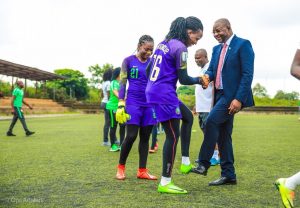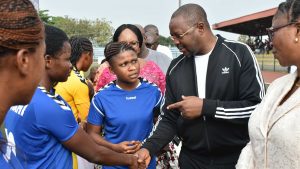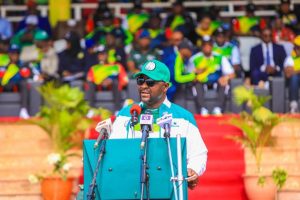The Heritage Times spoke with Nigeria’s Minister of Youth and Sports, Mr Sunday Dare. He spoke on scrapping the National Youth Service Corps (NYSC), security challenges in the country, drug abuse among athletes and sports contribution to Nigeria’s economy.
The Heritage Times spoke with Nigeria’s Minister of Youth and Sports, Mr Sunday Dare. He spoke on scrapping the National Youth Service Corps (NYSC), security challenges in the country, drug abuse among athletes and sports contribution to Nigeria’s economy.
Below are excerpts of the interview with our correspondent, Chioma Iruke.
uestion: You recently rejected calls by Honorable Members of the National Assembly to scrap out the National Youth Service Corps Programme, insisting instead that there were new dynamic reforms and initiatives being taken by the Government. Can you expatiate more on these reforms?

Answer: My reaction was part of a clear conviction that a programme that has been on for decades, a programme that was well envisioned and a programme that hundreds of thousands of Nigerians including myself, are proud to have participated in, to want to scrap it out at this point is unacceptable. There must be cogent reasons far beyond the point that Corpers are being killed. The point clearly is that reforms are ongoing, it started way back, four-five years ago. Are people paying attention to the reforms or assuming that things are still as they were. I give you a good example, there is the SAED programme which is a digital three weeks’ skill acquisition program, where you can learn how to do CCTV, repairs and all. It’s part of some of the skills Corpers gain during the youth service and we have heard several testimonies of Corpers who left and became entrepreneurs and they state that it is what they learnt during their service year under the SAED programme that gave them jobs after they finished their service. Now at the ministry of youths and sports we started what we called the NYIF, the Nigerian Youth Investment Fund, it is a N25 billion youth investment fund every year for three years. And we have done a linkage after your three weeks of SAED programme, if you think that you have an idea, and want to become an entrepreneur, you can apply directly for the NYSC loan and the fact that you have done the SAED program will be an added advantage. Two the N-power programme, it’s just a one-year programme, and we have also done a linkage that when you finish N-power, we can upload you to NYIF, but then there are requirements. You apply and then you have an opportunity from just taking an amount from government every month, to getting an amount or form of capital for you to start business.
That’s just on the side. We have also seen a return to making sure that the integrity and reputation of the youth service is brought back. We have also seen state governments complete their camps. So there are a lot of deep seated reforms and the NYSC is an institution like every other institutions like the MDAs and every other arm of government that undergoes reform. So if we want reform, you can’t say that because you don’t like a particular agency, it’s not serving its purpose, then we should scrap it. Scrapping is not the first option and I say it again, NYSC has impacted national development. When we line up our youths that have gone through this process they have their own stories, no one better tells the story of the NYSC than the average youth corper that has gone through it, some of them would be fantastic, some not too fantastic, but it is a noble program envisioned by the Yakubu Gowon led government and sustained several years in the last almost 60 years and it will continue and the government is committed to continuing the NYSC scheme.
Question: Many believe the NYSC is a waste of one year. If you were in a position to scrap the programme, what else would you rather have the youths do?

Answer: First, I am not in a position to scrap the NYSC, I don’t have that power and two, I would not support the scrapping of the program. I was a beneficiary, I have hundreds and hundreds of my friends who are beneficiaries, I finished my youth service 30 years ago and most of my friends we still talk about it and have no regrets about it. I have also seen several youth corners that have finished and some of them have gone further to get fantastic jobs. Some of them through the service have landed careers that have changed their lives, some of them through the youth service have met their life partners, some of them through the service have become millionaires through their entrepreneur skills, so this is a program that have multi-faceted benefits. But also let me say this, the NYSC program is the single largest concentration of Nigerian youths at any point in time, it has 340,000 Nigerian youths who are taught ethics of patriotism, nationalism, some of them have never moved out of Lagos but they now have the chance to go and serve in Akwa-Ibom or somewhere else and they learn about their country-built networks, build friends and I think that is also another brand of education. For me, even if I was in the position to scrap it, I would not scrap it.
Question: Given the current realities of Insecurity in the Nation is the scheme still visible?

Answer: Now let me ask you to give me data, it’s not enough to just say that youth corpers are being killed, give me data. Youth corners are also Nigerians, whatever situation they face now is also faced by all Nigerians. We just did a deployment to camps, youth corpers were deployed to Maiduguri, they were deployed to the North East, every part of the country has corpers, they were deployed to Borno, Sokoto, to Kebbi, and when this topic comes up, I say give me Data, X number of youth corpers were killed because they were traveling to Lagos to resume in another place. Understand me, even a singular loss is important but you won’t also say because there was one single casualty you don’t put the baby out without water.
Question: We know that deployment to this security-threatened area is ongoing, but is there willingness in the minds of these youths to go to these regions to serve?

Answer: Well that worry is legitimate, but when you look at it by and large, it’s an exception, in terms of the percentage of all those that are unwilling to go to such areas.
What the NYSC does is to increase their layers of security, increase the assurance given because it’s also part of the entire country. So I know that the NYSC DG and Directors are also considerate. For instance, I know that youth corpers are to be sent everywhere in this country and right now there is no single place that is tagged a no go area in this country, so deployment goes on, but I think it’s also a process of making sure that security is increased and a greater awareness is generated, but then those are legitimate fears, nobody wants any corper killed and anytime that happens it’s always a big loss for us.
Question: What are the steps being taken by your Ministry to curb the menace of drug use and abuse between athletes and young people alike?

Answer: Good question, but we would now separate drug use which is called doping in sports and the general use of drug. Drug addiction is a major societal problem and unfortunately, most of the victims are youths and I say that the National Youth Policy has about 12 major symmetric areas and one of them is that of drug use and we have the use of illicit drugs and substances. It’s a societal battle not just for the ministry alone and I know that as a ministry, we work with the National Assembly Committee on Narcotics and Substance Abuse. The greatest weapon is awareness, awareness to know the downside and implication of drug uses, even awareness and education when it comes to sports against doping. The greatest weapon against doping used by WADA, the World Anti-doping Agency, is awareness and education. That is, you must educate your sports men and women on the drugs and medication that they cannot take and the implication of these. To create more opportunity for our youths such that they are not living in disturbance and once you see clear opportunity at entrepreneurship, clear opportunity to build a career one way or another, opportunities to get jobs, I think that would also serve as an answer to reduce the level of substance use. I agree it’s a major societal problem and as a country we must marshal all our efforts both from the home front, institutional fronts and the NGO who have been playing a very credible role in this respect.
Question: Now aside oil and other critical sectors, how much money does the sport sector rake in for the country’s economy on an annual basis?

Answer: First you should know that we have never had the opportunity to host the Olympics and I hope that in distance future we would be able to host the Olympics. We are hosting the African Athletics Championship soon, later in June we would be able to do that in Lagos, Nigeria; and the Lagos State Governor is personally committed to making sure that Lagos is able to host 54 African countries for about a week. Apart from that, we are lucky that the Teslim Balogun stadium has been certified as world standard by the world athletics federation. Of course, once you get this kind of rights, they are going to come back to do a sport check and once they run that, then they might require that one or two upgrades be made. Until I became the Sports Minister, sports were classified as recreation. Nothing else, so it wasn’t seen as a business. Part of what I have done within the first one year is trying to build a sports policy that would have a business model in it and we felt the first thing was to go to council and say we need to reclassify sports from recreation to business and then we develop a policy that was business-oriented. We went to council with it and Mr President approved that reclassification from sports to business, which means we would now be an understudy, there would be data and we would be researched by the NBS and seen as a business sector. The last thing we need to do which is almost ready is a business model in sports. When you go to countries like Brazil, Jamaica, South Africa, countries where the sport is business, you look at the value chain, they are about seven points in the value chain of sponsored business, now ours like other countries, is predicated on other things that must happen and we call them three Is and one P. The first I is infrastructure, we cannot have sports as a business without having well standard infrastructure. The second is Investment, we must bring investment from the government and the organized private sector. The next is Incentive, the government must provide incentives, is it tax relief, tax holidays, low bank rates e.t.c and the last is the Policy that will encapsulate all of these. We are done, we are in the final stages and our copyright is with the AGF to look at the legal aspect of this and we are going to deliver on it. Once that is done, we would see a revolution in our sports sector and that’s when we can actually pin down exactly the kind of revenue that comes in from sports. If you ask me I don’t think it’s up to N350m that comes in from sports compared to the UK that is looking at about 41bn, the US is looking at about 46bn and that is because they have it as a business.
Question: Part of your Initiative when you came on board was the ‘Adopt a Talent Initiative’. Your predecessor, Solomon Lalong claimed it was stolen from late Sports Journalist, Jide Fashikun, what is your reaction to those claims, are they true?

Answer: My reaction is simple because I’m also a journalist by training, a simple search by anyone would know that those claims are false and self-centered. The Adopt a Talent Initiative as a concept was started in Canada and there is no patent to it. There is no patent to the building of the engine of a car, it’s what you put in your car that matters. What we have is totally different in it its entirety and we put up a document that shows seven differences between what he was talking about and what we are doing. We know what we are doing and we don’t have time for such, even just a little search and it’s alright. Check what this is all about, check what we have been able to deliver, on this we deliver $2.5m from the private sector, Surulere Stadium is coming back after 19years, Abuja after 14years of being abandoned. Through Adopt a Talent Initiative, we were able to do all this, what did that one deliver? Our athletes are receiving $20,000, $10,000 from the Adopt a Talent Initiative straight to their accounts to support them to train. This is about substance, whatever they had before I didn’t know about it, it wasn’t my interest. I had an idea from Mr President to come with the best ideas to deliver the sports sector, which is exactly what I am doing.



















